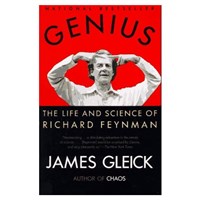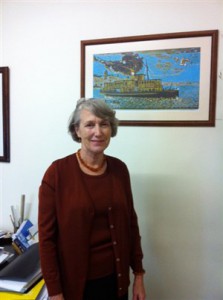Barbara Blackwell Gülen, Department of Translation and Interpretation
BY MELİS ERDEM (ARCH/II)
Reading “Genius: The Life and Times of Richard Feynman” by James Gleick and other books about this famous physicist affected my life. As a 1965 Nobel Prize winner in physics for his work on quantum electrodynamics, Feynman had a unique way of thinking and a quirky lifestyle that are delightful to read about. For example, this Nobel laureate rarely wrote anything because, Gleick states, “almost all Feynman’s work originated with the spoken word.”
The story of how I came across this book is interesting. I’ve always been curious about the cognitive process of creativity, because my husband was a Turkish artist and I was surrounded by creativity most of my life. So my reading has taken shape because of wanting to know why someone becomes a genius or a great musician or is so talented. In fact, this is so important to me that in my classes, one of the criteria that I grade on is creativity. I also try to get students to think about their cognitive processes.
Anyway, it may seem strange that I enjoyed a book about a physicist, because I’m neither a scientist nor a mathematician. It happened that while I was reading “The Journals of Captain James Cook,” which is about his explorations and surveys of coastlines, I wondered how Cook actually charted something as irregular as a coast. This search led to my discovery of fractals, defined by Wikipedia as “a curve whose complexity changes with the measurement scale,” and a discussion about fractals with a naval officer colleague. He said, “If you’re into fractals, you’d definitely be interested in Richard Feynman.” And I asked, “Who is Richard Feynman?” He explained that Richard Feynman was not only a physicist and Nobel Prize winner but also a colorful character about whom many entertaining books had been written.
 That colleague gave me most of the books I’ve read about Richard Feynman; for example, “QED: The Strange Theory of Light and Matter,” “What Do You Care What Anybody Thinks?” and “Surely You’re Joking, Mr. Feynman.” And they’re not all on physics. What is very interesting about this man is that he had the ability to explain very complicated concepts so simply that anyone could understand them. So I wanted to know how he became a genius. What was it? Was it his DNA, was it his family? What exactly made this man what he was?
That colleague gave me most of the books I’ve read about Richard Feynman; for example, “QED: The Strange Theory of Light and Matter,” “What Do You Care What Anybody Thinks?” and “Surely You’re Joking, Mr. Feynman.” And they’re not all on physics. What is very interesting about this man is that he had the ability to explain very complicated concepts so simply that anyone could understand them. So I wanted to know how he became a genius. What was it? Was it his DNA, was it his family? What exactly made this man what he was?
I read all of those books on Feynman, but the best was “Genius.” It is quite technical, but it gave me some answers and insights into his family life and the way he thought about things. Feynman compared his family with others in New York; he said that when he was a child, his peers’ parents were all making their children memorize the labels, the titles, the names of things: trees, flowers, birds and everything. But his father didn’t teach him in that way; he taught him to think about what the relationship was between a tree or a plant and its environment. It wasn’t important to know the name; it was important to know how the organism grew and how it functioned in its environment. This might have contributed to his curiosity about so many different things.
And so this book made me think about my teaching, and how I could try, although it’s not easy, to get students to do complicated things through simple procedures. And that’s why this book has been influential in my life.

